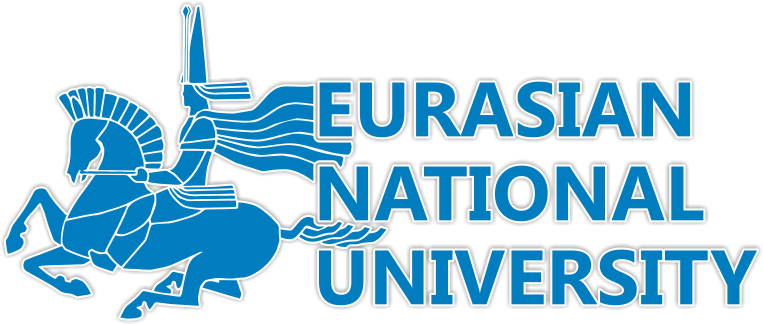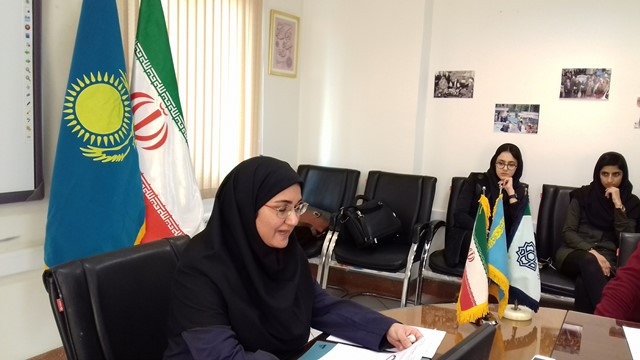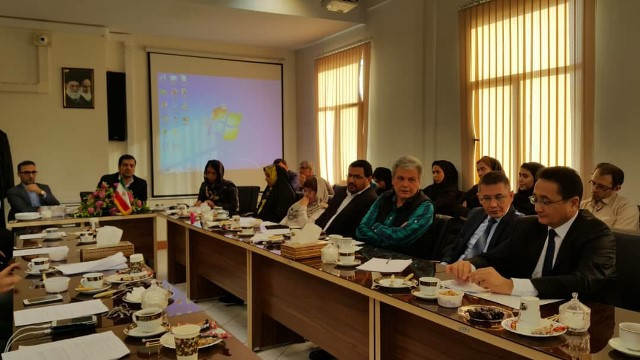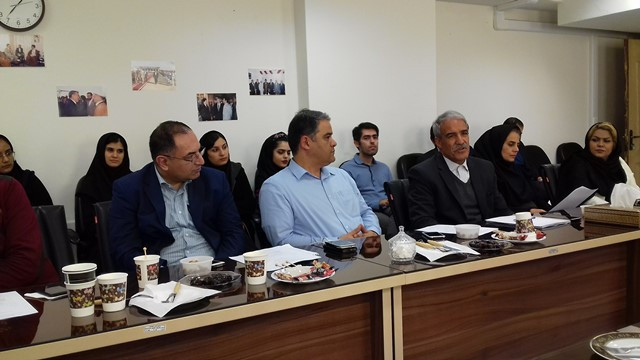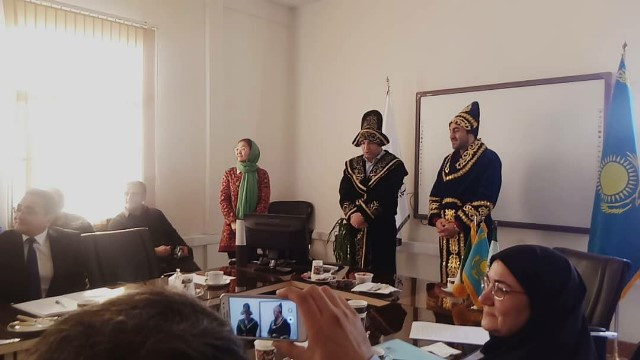On Tuesday, December 11, 2018, a round table entitled “Independence Day of Kazakhstan” was held at the Iran-Kazakhstan Academic and Cultural Center of Allameh Tabataba’i University. The current state of relations between Kazakhstan and Iran, dedicated to the 27th anniversary of the independence of the Republic of Kazakhstan. The organizers once again made the L.N. Gumilyov Eurasian National University, Allameh Tabataba’i University and the Embassy of the Republic of Kazakhstan in the Islamic Republic of Iran.
As is known, this Center was opened in Tehran on May 6 of this year at the initiative of the First Vice-Rector of ENU Moldazhanova Asemgul with the participation of the Rectors of the L.N. Gumilyov Eurasian National University (ENU) and the Allameh Tabataba’i University (ATU).
The event was attended by students, professors and administrative staff of the Allameh Tabataba’i University. The representatives of the Embassy of Kazakhstan were attended by Acting Ambassador Extraordinary and Plenipotentiary of the Republic of Kazakhstan in the Islamic Republic of Iran Akhmetov Yerbol and Consul Khaidarov Bekmurat.
At the beginning of the event, the national anthems of the Islamic Republic of Iran and the Republic of Kazakhstan were sounded. Further, in a congratulatory speech by the Director of the Institute of Higher Education of ECO at ATU, Dr. Gudarzi told about the history of the creation of the Institute of Higher Education of ECO, curricula within the framework of this Institute, including scholarship programs for students from member countries of ECO to study in Iran. It was also the invitation of Kazakhstan students to participate in these programs. It was also said about the friendly relations between Iran and Kazakhstan and the special significance of these relationships for both countries. Special attention was paid to the development of relations in the field of culture, education and science. Then, in the speech it was spoken about the development of cooperation between ENU and ATU after signing the Memorandum of Understanding 2015 between them: training Iranian students at the Eurasian University during one semester in the winter 2015; invitation of teachers of ENU to Iran in spring 2016; a trip of students of the Department of Regional Studies of the Institute of Higher Education of ECO and Turkology of the Faculty of Foreign Languages and Literature of the ATU; inviting four teachers of ENU and two teachers of ATU to participate in international conferences of the universities; inviting professors from the University of Astana to teach at the Institute of Higher Education of ECO for one semester in the autumn 2017; the opening of the Iran-Kazakhstan Academic and Cultural Centre with the participation of the rectors of two universities in the spring 2018; excursion of undergraduates and teachers of ATU to the Eurasian University and holding a seminar in the field of cooperation between the two countries in the autumn 2018; the launch of a joint program for training in the magistracy of the Department of International Relations in the autumn 2018; the beginning of teaching Kazakh language at the Allameh Tabataba’i University in the fall 2018; organization of three round tables on acquaintance with the history, culture and society of the Republic of Kazakhstan in the Iran-Kazakhstan Academic and Cultural Centre in the fall and winter 2018; management of four scientific works by consultants and professors of two universities. In conclusion, congratulations sounded on the Independence Day of the Republic of Kazakhstan.
Further, the Acting Extraordinary and Plenipotentiary Ambassador of the Republic of Kazakhstan in the Islamic Republic of Iran Akhmetov Yerbol was invited to speak, who gave a brief information on the establishment and development of diplomatic relations between Kazakhstan and Iran. Iran was one of the first countries in the world to recognize the independence of our republic. The diplomat spoke about the historical prerequisites for establishing relations between the Kazakh and Iranian peoples, the existence of common historical roots, about such unifying factors as culture, art, literature, language, and the celebration of Nauryz is one of the illustrative examples of the mutual influence of civilizations. At present, our political, economic, trade, cultural, and scientific relations have a positive dynamic. Yerbol Abanuly characterized bilateral relations as strategically important for both states. Hope was expressed for the further strengthening and development of cooperation between Kazakhstan and Iranian universities, including with the Institute of Higher Education of ECO at ATU. Kazakhstan attaches particular importance to Iran in supporting security in the region, and the active participation of the Iranian side in the Congress of Leaders of World and Traditional Religions, which takes place once every three years, is positively evaluated. In 2018, from the Iranian side, Ayatollah Mohsen Mohammadi Araki participated. It was also mentioned the cooperation of Kazakhstan and Iran in the framework of regional and international organizations such as the UN, SCO, OIC, etc. And, naturally, it was said about the meetings of the heads of state and representatives of various ministries of both countries.
The following report “Iran and Kazakhstan cooperation in the field of transport and transit. The 2013 initiative of the President of China “One Belt - One Road” on the Great Silk Road” was delivered by a lecturer of the Department of Russia, Central Asia and the Caucasus Studies of the “Eurasia Studies” Specialty of the Faculty of World Studies, Tehran University, “ Eurasia Studies” Specialty of the Faculty of Ecology and “Political Science” Specialty in ATU, Doctor of Political Sciences and Geopolitics Bahram Amir Ahmadian was positively accepted by the states of the region, as well as by Iran. This project will involve 60 countries and about 200-300 large organizations. The first draft of the project will pass from China via Mongolia, Russia, Belorus, then to Bulgaria, Poland and Germany. The second path goes through the Central Asian region and is interesting to Iran and Kazakhstan, therefore it must be supported by the leadership of both states and offered to Russia and China, according to the professor. This second route will pass by rail through Kazakhstan, Turkmenistan, then through Iran to the border of Iraq, then it would be possible to pave the road in Syria, and this would help Syria recover from the war. China can be offered, as a country with great potential, including financial ties, to support this version of the project, justify its profitability first of all for the Republic of China itself. In the morning, Amir Ahmadian was at the Ministry of Roads and Urban Planning of Iran and this topic was raised there. The ministry is wondering why the Central Asian states do not use Iran’s potential in this matter. By the way, relations between Iran and Uzbekistan have improved and the favorable geographical location of Uzbekistan could also be used; the railway between Herat and Mazar-i-Shariv (in Afghanistan) has been built and will continue to be laid through Iran to Iraq (work is currently underway). The only part of the road that remains to be finalized is the road through the territory of Kazakhstan. Autumn 2018 held a conference in Tehran, timed to coincide with the anniversary of the creation of the Assembly of Friendship of Iran and China, these points were discussed at it. China is impressed by this direction. In addition, Kazakhstan, Afghanistan, Turkmenistan, Uzbekistan, Iran are members of ECO and could strengthen their positions and cooperation within the framework of this organization too. Unfortunately today our countries do not cooperate in the field of transport in the framework of ECO. Pakistan, for example, does not have the ability to develop the transport potential of the country on the border with Iran. The proposal of the Iranian professor was about cooperation of Kazakhstan and Iran in the direction of the development of the transport potential of the two countries; about academic collaboration to better know each other's potential; on the establishment of a department at the Embassy of Kazakhstan that would work with Iranian universities and conduct activities based on the opinion of scientists in the field of interests.
Director of the Center for Internationalization and Image of L.N. Gumilev ENU, PhD, Professor (Turkey) Seit Ali Avcu rated relations between Kazakhstan and Iran as very good. Eurasian National University and Allameh Tabataba’i University develop ties: in May 2018, the Iran-Kazakhstan Academic and Cultural Centre was opened at ATU, several doctoral students were sent to Iran, and ENU received several Iranian undergraduates; both universities have agreed on double-diploma education in master's and doctoral studies. The doctor expressed hope for further cooperation and gratitude to the Rector of the ATU, Hossein Salimi and Mandana Tisheyar, Majid Momeni, and other employees and professors of the university who help develop relations between two universities. In conclusion, Seit Ali Avcu congratulated Kazakhstan on Independence Day and wished fruitful work at the round table.
The next speaker was Behruz Kyzyl, a researcher and Central Asia specialist at Tehran University, with the report “Opportunities and obstacles to the development of trade and economic relations between Iran and Kazakhstan; the potential of the border province of Golestan in northeastern Iran“. It was said about the favorable geopolitical location of Kazakhstan and Iran, the vast territory of Kazakhstan, the great transport potential of both countries. At the same time, Iran and Kazakhstan have some difficulties in developing economic and trade cooperation. The province Golestan has the greatest potential for economic cooperation with the Kazakh side. One of the weighty factors is the residence of a large number of Kazakhs in Golestan. The lack of direct flights from Iran to Kazakhstan, in particular, between the above-mentioned regions is one of the factors that impede the full-scale development of the economic relations of this province with the Western Kazakhstan cities. It would be good to establish a direct connection to the Caspian Sea for tourist trips as well. Bekhruz Kyzyl expressed his wish for close interaction between the two neighbors in the field of economics, but not ideology, this would have a positive impact on the political and economic situation of the countries.
Professor of the Department of International Relations of the L.N. Gumilyov Eurasian National University, Doctor of History, Esdauletova Ardak Melsovna made a presentation “Transport and infrastructure corridors between Kazakhstan and Iran”. According to the doctor, the creation of an unified transport system is one of the most promising sectors in expanding cooperation between the two republics. The presentation referred to the commissioning of the Kazakhstan-Turkmenistan-Iran railway and its significance for the economies of both countries, one of the important events for the Caspian countries: the Caspian Sea Summit on August 12, 2018, which, as regards bilateral cooperation, discussed issues cooperation in the field of railway, aviation and road transport, the opening of airline flights between Gorgan-Aktau, the opening of trading houses in the Mangystau region and Golestan, the construction of an elevator on Incheburun railway station, opening FEZ Incheborn and in facilitation of visa between the Golestan and Mangistau provinces.
Further, the program was followed by questions from the participants and guests of the round table. Those present were interested in the issues of exploitation of Baikonur, simplifying the visa regime for Iranian citizens, the problems of the Semipalatinsk test site, and raised the issue of Iranian Azerbaijanis living in Kazakhstan from 1945-46. Also ATU professor, doctor of international relations Hamid Hakim subjoined that from the countries of the Central Asian region Kazakhstan is the country with which Iran has the least number of challenges and good relations are established, that Iran and Kazakhstan are not competitors, moreover, the economies of the two countries complement each other, exchanging products that the other side lacks.
At the end of the program followed the performance of students of the Kazakh language course with the song "Kazakh tili" in national dress, where the speakers showed not only their vocal abilities, but also transmitted the content of this musical work from Kazakh to Persian for those presents. The participants also picked up the rhythm of the song in the Kazakh language, relying on the transcription of the song in Latin letters prepared before.
In the cabinet it was showed photos of historical events in the development of relations between Kazakhstan and Iran, transmitted to the Iran-Kazakhstan Academic and Cultural Center by the delegation of ENU in the spring 2018.
A translator from the Kazakh department of the Pars Today website in the Iranian television and radio company (www.parstoday.com/kk) Omarhanova Gauhar was invited to cover this cultural event in the Iranian media.
Tyulyubayeva A.
